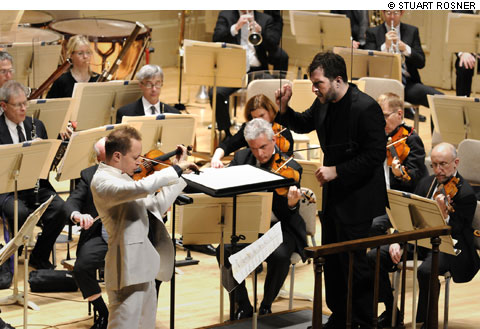
MERCURIAL Anthony Marwood gave a masterful reading of the violin concerto that Adès wrote for him. |
After too many weeks of watching the Boston Symphony Orchestra scramble to replace maestro James Levine, both in Boston and on tour, we finally got a concert that went as planned. The 40-year-old British composer/conductor/pianist Thomas Adès made his BSO debut, as scheduled, in a compelling program based on the last play entirely in Shakespeare's hand, his magical (maybe even autobiographical) late romance, The Tempest.The evening began with Tchaikovsky's early "Symphonic Fantasia," The Tempest (Opus 18), the only piece on the program the BSO had played before (under Hans Graf in 1999 and 2003). Casually constructed, it's not one of the composer's most melodically memorable scores, though you can hear gestures evoking characters and events in this play that would return in Tchaikovsky's more inspired work. Sibelius also has Tempest music. Late in a career that ended midlife, he composed incidental music for a Danish production, and he made two suites of excerpts far more sophisticated than Tchaikovsky's score. Adès chose the stormy Prelude and Suite No. 1, which ends with another brief but ferocious storm and includes an enchanting "Berceuse" and a dark, "Finnish" setting of Ariel's song "Full Fathom Five."
In between came the American premiere of Adès's 2005 Violin Concerto, which got a masterful reading from the white-suited Anthony Marwood, for whom it was written. He won cheers from the crowd and a kiss from Adès. It's a mercurial piece, which begins — and spends a lot of time — in the violin's upper registers (like Prokofiev's First Violin Concerto). The slow middle movement is the most original, with the violin spinning out a kind of exploratory lyricism between brusque orchestral chords and pizzicatos.
The concert concluded with (as it were) its centerpiece: scenes from Adès's The Tempest, his sparkling 2004 opera. The high-lying violin "voice" of the concerto is the most remarkable vocal element in the opera. Ariel (the phenomenal Israeli soprano Hila Plitmann) never descends much below high E, and her "Full Fathom Five" (perhaps needlessly rendered into contemporary English by librettist Meredith Oakes as "five fathoms deep") has a haunting, otherworldly melancholy. Even without this "gimmick," all the vocal parts and the imaginative orchestration radiate a melodic and orchestrational freshness that never wallows in syrupy bathos. Adès's role model is Britten, not Puccini. And all the performers lived up to the score. Bass Christopher Maltman was a resonant and moving Prospero; tenor Toby Spence, Adès's original Ferdinand, made an appealingly romantic figure despite the vocal challenges in this role; and winning, plush-voiced soprano Kate Royal was an ideal Miranda. Adès led with considerable skill and complete conviction, and the orchestra seemed to love playing all this "new" repertoire. Adès's enchanting program appeared to be saying, "Listen to how the great composers of the past set Shakespeare — it's not the only way."
 Topics
Topics:
Classical
, Evgeny Kissin, Jordan Hall, Boston Symphony Orchestra, More  , Evgeny Kissin, Jordan Hall, Boston Symphony Orchestra, Matthew Polenzani, Matthew Polenzani, THE TEMPEST, Thomas Adès, Less
, Evgeny Kissin, Jordan Hall, Boston Symphony Orchestra, Matthew Polenzani, Matthew Polenzani, THE TEMPEST, Thomas Adès, Less 